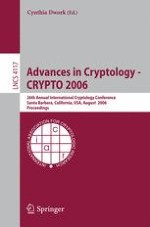2006 | OriginalPaper | Buchkapitel
On Robust Combiners for Private Information Retrieval and Other Primitives
verfasst von : Remo Meier, Bartosz Przydatek
Erschienen in: Advances in Cryptology - CRYPTO 2006
Verlag: Springer Berlin Heidelberg
Aktivieren Sie unsere intelligente Suche, um passende Fachinhalte oder Patente zu finden.
Wählen Sie Textabschnitte aus um mit Künstlicher Intelligenz passenden Patente zu finden. powered by
Markieren Sie Textabschnitte, um KI-gestützt weitere passende Inhalte zu finden. powered by
Let and
$\mathcal A$
and
$\mathcal B$
denote cryptographic primitives.
$\mathcal A$
(k
,m
)-robust
$\mathcal A$
-to-
$\mathcal B$
combiner
is a construction, which takes
m
implementations of primitive
${\ensuremath{{\cal A}}}$
as input, and yields an implementation of primitive
${\ensuremath{{\cal B}}}$
, which is guaranteed to be secure as long as at least
k
input implementations are secure. The main motivation for such constructions is the tolerance against
wrong assumptions
on which the security of implementations is based. For example, a (1,2)-robust
$\mathcal A$
-to-
$\mathcal B$
combiner yields a secure implementation of
${\ensuremath{{\cal B}}}$
even if an assumption underlying
one
of the input implementations of
${\ensuremath{{\cal A}}}$
turns out to be wrong.
In this work we study robust combiners for private information retrieval (PIR), oblivious transfer (OT), and bit commitment (BC). We propose a (1,2)-robust PIR-to-PIR combiner, and describe various optimizations based on properties of existing PIR protocols. The existence of simple PIR-to-PIR combiners is somewhat surprising, since OT, a very closely related primitive, seems difficult to combine (Harnik
et al.
, Eurocrypt’05). Furthermore, we present (1,2)-robust PIR-to-OT and PIR-to-BC combiners. To the best of our knowledge these are the first constructions of
$\mathcal A$
-to-
$\mathcal B$
combiners with
${\ensuremath{{\cal A}}}\neq {\ensuremath{{\cal B}}}$
. Such combiners, in addition to being interesting in their own right, offer insights into relationships between cryptographic primitives. In particular, our PIR-to-OT combiner together with the impossibility result for OT-combiners of Harnik
et al.
rule out certain types of reductions of PIR to OT. Finally, we suggest a more fine-grained approach to construction of robust combiners, which may lead to more efficient and practical combiners in many scenarios.
